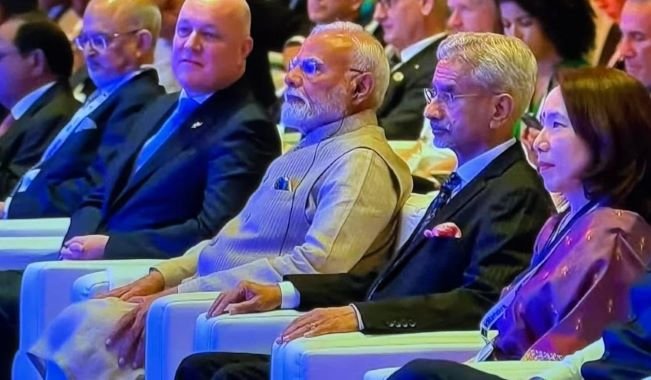Jaishankar Criticizes UN’s Approach on Kashmir, Calls for a Reformed World Order
External Affairs Minister S Jaishankar, speaking at the Raisina Dialogue 2025, took a strong stance against the United Nations’ failure to fairly address the Kashmir issue. He pointed out how the UN’s historical handling of the situation has led to misinterpretation, where aggressors and victims were equated. Calling for a fair and reformed global order, he emphasized the need for a more balanced and consistent application of international norms.
UN’s Mistakes on Kashmir: A Historical Perspective
Jaishankar underscored that India has been the longest-standing victim of illegal territorial occupation since World War II. He reminded the audience that Jammu and Kashmir, including Gilgit and Baltistan, had legally acceded to India in 1947. However, Pakistan’s military aggression led to the occupation of parts of the region, a fact that remains ignored in many global discussions.
Raising concerns over selective international responses, he highlighted that when India approached the UN for intervention, Pakistan’s invasion was rebranded as a dispute, putting both the aggressor and the victim on the same footing. This, he argued, was a major diplomatic failure that shaped how global institutions dealt with similar conflicts in the future.
The Need for a Stronger and Fairer UN
Jaishankar reiterated that global rules on sovereignty and territorial integrity must be applied uniformly. Criticizing the Western powers that played a role in shaping the UN’s stance, he pointed out how countries like the UK, Canada, Belgium, Australia, and the US were responsible for undermining India’s rightful claim by labeling the crisis as a mere “dispute.”
Calling for urgent reforms within the UN, he stressed that a strong global order can only function if it is fair and transparent. He argued that inconsistent applications of global rules have allowed certain countries to exploit geopolitical instability to their advantage.
Double Standards in Global Governance
Without directly naming Pakistan, Jaishankar also highlighted how military regimes in certain regions are viewed differently by the international community. He noted that while military rule in Myanmar is widely condemned, similar governance structures to India’s west receive little scrutiny or pushback. This, he suggested, reflects inherent biases in global decision-making and underscores the urgent need for a new world order that truly represents today’s geopolitical realities.
“We Need a Different Global Conversation”
Jaishankar emphasized that global governance must evolve in line with the changing balance of power. He urged world leaders to critically assess the last eight decades of international policy-making and recognize that current power structures no longer reflect today’s geopolitical realities. He called for a more inclusive and transparent international order, stating that no country—big or small—should be allowed to exploit global disorder to further its own agenda.
At a session titled “Thrones and Thorns: Defending the Integrity of Nations”, Jaishankar reiterated India’s demand for a more equitable international system, one that acknowledges the interests and contributions of emerging powers while ensuring a consistent application of global rules.
Key Takeaways:
- Jaishankar criticized the UN’s handling of Kashmir, highlighting its failure to hold Pakistan accountable for illegal occupation.
- He called for a reformed and stronger UN, where global rules on territorial integrity are applied consistently.
- The Foreign Minister pointed out Western biases in global decision-making, especially in their approach to military regimes.
- He urged world leaders to reassess the last eight decades of international governance and push for a new global order.
- The speech at the Raisina Dialogue 2025 reinforced India’s position on global justice and sovereignty.
As India continues to advocate for UN reforms, Jaishankar’s remarks highlight a growing demand for fairness in global diplomacy. The coming years will reveal whether the world’s major institutions will acknowledge these calls for reform or continue with status quo governance structures.
Also see:
Trump Announces “Reciprocal Tariff” Plan, Targets India and Other Nations
Tesla Signs Mumbai Showroom Lease, Marks Entry into Indian Market
EU Unveils €800 Billion Plan to Strengthen Defence
—————————————————————
It would mean the world to us if you follow us on Twitter, Instagram and Facebook




